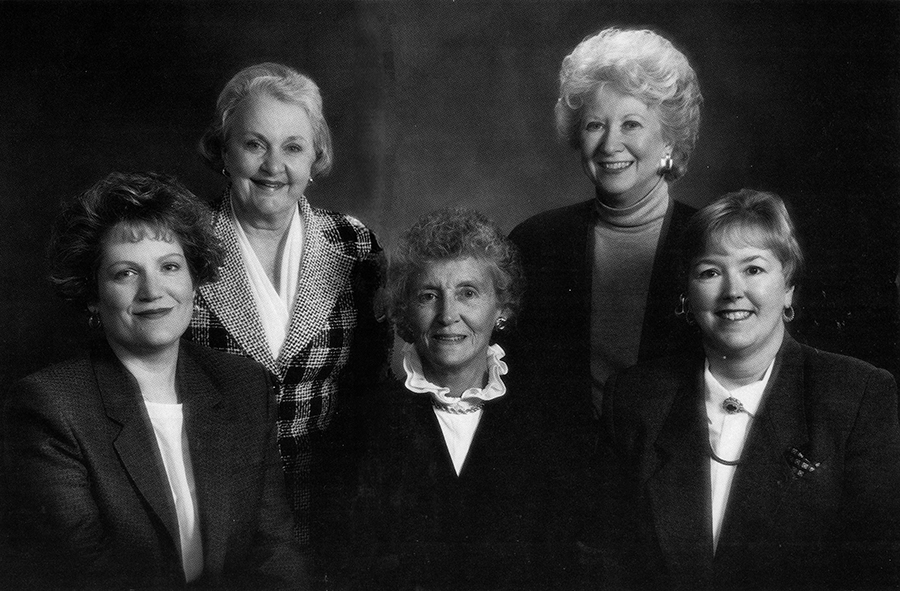By Sara L. Wilkins
HQ 17 | SPRING 1994
As spring begins her long awaited descent on the winterweary city of Huntington, there’s a hint of promise in the air. A promise of warmth, a promise of greenery, a promise of rebirth.
But it’s not just the promise that comes with the changing of the seasons. It’s also the sense that the city is about to shed its cloak of malaise and rise like the fabled phoenix from the ashes – renewed, reinvigorated and united with a sense of purpose: to make a good community ever better.
Huntington can count among its riches not only its physical beauty but also the strength of its citizenry, from its highly recognized civic leaders to its unsung volunteers. Hundreds of these special citizens donate their time, energy and enthusiasm on almost a daily basis to ensure the community’s elevated quality of life. And recently, they have been joined by hundreds more who have enlisted in citizens’ task forces to help us move successfully into the 21st century. Who are these community activists? What motivates them to toil tirelessly on behalf of the entire city? What do they believe are Huntington’s strengths? And what do they see for the city’s future, especially in a heightened atmosphere of cooperation and determination?
Allow me to introduce you briefly to five such dedicated people: Betty Barrett, Jean Dean, Nancy Francis, Renee Maass and Beverly McKinney – all of whom are accomplished women whose professional and/or civic careers have kept them in the forefront of Huntington’s pursuit of excellence, and all of whom wouldn’t live in any other city on earth.
Betty Barrett is a vibrant woman with an inviting smile. She’s also a scrappy member of the Huntington City Council and the dedicated president of the Cabell/Huntington Coalition for the Homeless.
A native of Chicago, Barrett graduated from Milwaukee Downer College in 195 5 with a degree in occupational therapy. Early that year, she met her future husband, Edgar 0. Barrett, a West Virginian who was stationed in Milwaukee with the Air Force. The two were married in December 1955 and moved to Morgantown, where he was with the sports information program at West Virginia University.
The Barretts have five children: Kevin, 36; Richard, 34; EdgarO.Jr. (Ned), 31; John, 27; and Ann, 25. They also have a grandson, Christopher, 7.
The Barretts moved to Huntington in 1967 when Edgar was named athletic director at Marshall University. Betty remained at home with the children, but became interested in the League of Women Voters. Her first assignment with them was a study on solid waste, “and I’ve been in solid waste ever since,” she quipped. Barrett also served as the president of the L WV for several years.
Barrett’s first venture into the political scene occurred in 197 6, when Congressman Ken Bechler asked her to become acting district assistant. In that position, Barrett contacted agencies for people who called her office with problems. Barrett credits this job, which lasted only a few months, with playing an important role in her future. Concurrently, Barrett had been working with Ruth Sullivan for the information and referral service of the National Society for Autistic Children, which is now located in Washington, D.C. Barrett served as Sullivan’s administrative assistant and then as assistant director until 1979, when the office was moved.
Barrett then decided to return to school to pursue a master’s degree in political science with a major in public administration (all that remains for her now to complete the degree is her thesis). As an adjunct to her studies, Barrett volunteered in 1984 to work with the Public Housing Authority to develop a tenant association. It was this experience that piqued her interest in the housing of low-income persons, Barrett says – an interest which is paramount in her civic life today. Barrett served on the city Charter Review Committee in 1984 and was elected to City Council from District 6 the following year. She was re-elected in both 1989 and 1993 as an at-large member and served as chair of the Council in 1989.
In 1986, Barrett joined the fledgling Mayor’s Task Force on the Homeless, which was formed to improve the way city services were handled for the homeless. In 1987, the task force was incorporated to become the Cabell/Huntington Coalition for the Homeless; she has served as its president (an unpaid position) since that time and was volunteer director from 1990-92, when a paid position was created.
The Coalition, with assistance from the Huntington Housing Authority, created Harmony House, which offers health and social services under one roof. Housing projects of Harmony House include the 53-unit Vanity Fair Apartments and the 12-unit Mid City Apartments.
Barrett also serves as secretary of the Family Resource Network, and is on the boards of Huntington Main Street; the West Virginia Task Force on Children, Youth and Families; and the Salvation Army. Barrett was honored by the The Herald-Dispatch as its Citizen of the Year in 1989.
Both of Barrett’s parents were social workers in Chicago, and she credits her own civic activities to her family’s heightened social awareness. “The thing that means the most to me is that I represent the whole community,” she remarked. “I work on a number of different issues, and I want to make sure that we realize that there are people who are affected by all these issues, many of whom need help and can’t pay their own way. We need to remember that quality of life extends to all our citizens,” she continued.
“I love this community. There are wonderful people here. Our family has received so much from the community, and I think it is important that everyone give back to the community in whatever way possible,” Barrett said.
Barrett is hopeful for Huntington’s future. “There’s a greatly changed attitude here now – people are more positive. But we’re not going to get anywhere unless we take control of our own destiny,” she concluded.
Mayor Jean Dean exudes all the charm and grace of her native London, England. She also possesses an astute understanding of how Huntington runs, and how she’d like to see it managed for the future.
Dean received an associate degree in secretarial science in London and began her career as a legal secretary. She met her first husband, Logan County native Richard Gibson, in London, where he was serving with the Navy. The two came to Huntington in early 1956. Shortly thereafter, the family grew to include twin sons, Justin and Keith, and daughter, Diana.
Dean’s first marriage ended in divorce, and in 1979, she married Huntington architect Keith Dean. Their blended family now includes six grandchildren.
When her daughter began first grade in 1962, Dean went to work as an insurance underwriter for the Chubb Group. She remained with them for six years until the Huntington office was consolidated with the one in Pittsburgh. She then accepted several temporary secretarial assignments, one of which was for a company owned by a member of City Council. He was so impressed by her work that he suggested Dean apply for the position of executive secretary to the Huntington City Manager. She was promptly hired for the job in early 1969.
Dean made it a point to learn everything about city operations, budgeting, and departmental organization. The job afforded her an excellent opportunity to become immersed in city government. One particularly important lesson learned over the years, according to Dean, was how to listen to people and to work to solve their problems.
She was not promoted until 1980, when she was named assistant city manager. Two years later, Dean was made acting city manager until Wayne Bowers was hired in 1983 – she then became the city’s personnel director.
When Mayor Bobby Nelson took office in January 1986, Dean was named director of administration and finance – a position she held until resigning in May 1992 citing differences with Nelson.
Almost immediately thereafter, Dean decided to run for Mayor. “I felt that I could do the job a whole lot better than it had been done before,” she admitted. “I wanted to show people that you could run a good clean government without any ties.” She was elected Mayor in June 1993.
Dean has been a volunteer for the Little League and the PTA, but her strongest commitments are to her church and to musical activities, especially singing. In 1964, she became a charter member of the Musical Arts Guild.
Dean is unabashed in her praise of Huntington. “I have lived here longer than in any other place. This is my home, and it’s been very good to me,” she said. “I’ve been fortunate in seeing all my children graduate from Marshall, which was important to me. And I wanted to help, to improve, to build. There are many benefits in the Huntington community – the low crime rate, the ability to get from one place to another in a short time and a relaxed atmosphere,” she continued.
Dean stresses the importance of realizing what a great community Huntington is. “We need a better sense of pride and awareness,” she noted. “The city, in the past 20 years, has not had the self-confidence to forge ahead. If we keep looking back at our failures, we’re never going to move ahead,” she said.
She, too, is optimistic about Huntington’s present and future. “We need to keep the momentum of rejuvenating downtown. People are seeing that they must make a change and that they can make a change,” she added. “The best way I can help is to communicate with individuals and with groups, to forge a greater sense of cooperation among them. I’m a firm believer that we all must work together,” she concluded.
Vivacious and exuberant with a fondness for blue jeans, Nancy L. Francis might well be called one ofHuntington’s most recognized “professional volunteers.”
The Piedmont, California, native is a 1944 graduate of Stephens College in Columbia, Missouri, where she majored in psychology and sociology. After graduating, she returned to the Bay Area where she met future husband David Francis, a Huntingtonian who was working in the armaments industry nearby. After a whirlwind courtship, the two were married and arrived in Huntington in late 1945.
The Francises have three children: James, 47; Kathy, 44; and Anna, 39. Francis also has two grandsons, Daniel, 16, and Adam, 14.
Francis has always been active in the community, regardless of where she lived. Her mother served as her role model, allowing Francis to volunteer with underprivileged children when she was just 13 herself. “I wanted to start doing things right away when we moved to Huntington,” Francis said. Her first board seat, to which she was elected in 194 7, was with the Family Service. Other than Family Service, she has been president of every organization with which she has ever been involved.
Among her many “pet” projects are the United Way (she was president three times), the Huntington Museum of Art (she has been on the board since it was built in 1952 and has been president twice), and the Yeager Scholars Program at Marshall University (the 1993 Yeager class was named the “Francis Class”). Currently, Francis serves as president of the Marshall University Foundation, where she hopes “to bring up a new generation of activists.” She was also honored as The HeraldDispatch’s Citizen of the Year in 1993.
“I believe that everybody, regardless of their circumstances, should volunteer to do something. Everyone should experience the joy of adding something to the community,” she remarked.
And for Francis, being a volunteer truly is a joy. “If! go through a day and haven’t done something for someone else, then I feel deprived. Helping other people makes me feel like I’m doing something with my life. I count my blessings every day, and if I can give a blessing, then I’m happy,” she said.
Francis said she has had the opportunity to travel the world, but has never found a better place to live than Huntington. “Huntington is a beautiful place to live. When you go to a Pops Concert at the riverfront, you can watch the sun set and the moon rise,” she noted. “And there are so many wonderful people here – a lot of good people making a real effort,” she added.
As for the future, Francis believes that if we want things to happen, we must make them happen. “We must take action instead of studying everything,” she insists.
Renee C. Maass is a virtual powerhouse of energy, enthusiasm and optimism. The executive director of Huntington Main Street is a commanding presence downtown, where she has guided more than 40 renovation/rehabilitation projects representing some $3 million of investment.
A native of Atlanta, Georgia, Maass graduated from Auburn University in 1977 with a degree in history. Two years later, she married veterinarian Dr. Wayne W. Maass, now owner of the Guyan Animal Hospital in Huntington. They have two sons, Andrew, 12, and James, 9.
Before the Maasses moved to Huntington in January 1983, she worked in Atlanta for a cable systems company in the field of government and community relations. Shortly after arriving in Huntington, Maass took a job with CILCO as a bid and contract administrator – a position she kept until the birth of her second child.
Maass remained a full-time mother until being hired in May of 1990 to replace Main Street’s outgoing director Paula Crawford.
Maass said her interest in historic preservation was a motivating factor in applying for the job.
“I was brought up with an appreciation for historic preservation because my mother does renovations and restorations in Atlanta,” Maass said. “I also liked the aspect of working with volunteers because I had done a lot of volunteer work when I was not employed outside the home,” she continued.
As executive director of Huntington Main Street, Maass administers a full range of programs including publications, community awareness, historic preservation advocacy, downtown rejuvenation and the low-interest loan program. “Our low-interest loan pool program is the largest and most successful program of all 700 Main Street cities in the U.S.,” Maass noted proudly, citing data from the National Main Street office. “It’s a wonderful example of three different entities working together for the benefit of the community,” she remarked.
Those entities, she explained, are: (1) the financial institutions, who actually loan the money at a preferred interest rate; (2) the city, which further subsidizes the interest buy-downs on the loans; and (3) Huntington Main Street, which ensures that the projects are done in an architecturally-sympathetic manner – that is, ensuring the architectural integrity of the building.
Maass has every reason to be enthusiastic about the renaissance of downtown Huntington. In each of the past three years, a downtown restoration project has been selected by West Virginia Main Street as “Project of the Year,” and word has it that yet another city project is in strong contention for the 1994 award.
Maass is deeply committed to remaining in Huntington. “We’ve had opportunities to go back to Atlanta but we don’t want to leave. There are so many positive aspects about Huntington – especially the lack of crime and the ease of everyday living,” she noted.
“To whom much has been given much is required,” Maass continued. “It’s up to people like us to ensure that the community stays this way,” she added.
Maass is optimistic about the future but recognizes that people continue to believe that “something has to be done about downtown.” Her challenge, she says, is to educate people about the dramatic turnaround that the downtown is experiencing.
Beverly S. McKinney is the talented, savvy and accomplished director of marketing for Banc One West Virginia Corporation. McKinney was born and raised in St. Albans and attended Morris Harvey College as an English major. She began her career in banking in 1964, when she went to work for The Bank of St. Albans as a statement clerk. She was promoted numerous times during the next five years, and when she left the bank in 1969 she had progressed to the position of loan secretary.
That same year, she married Robert L. (Bob) McKinney, now president of Bank One West Virginia, St. Albans, NA. They have two children, Robert, 23, and Heather, 21.
Also in 1969,McKinney went to work for Chemical Bank and Trust in South Charleston as a universal teller and loan production clerk. The McKinneys moved to Huntington in the summer of 1970 when Bob took a job at First Huntington National Bank. The following year, the family moved to Atlanta, where they remained for five years. She continued her banking career there, reaching the position of personal banker.
The McKinneys returned to Huntington in 1976, and she went to work for the First Bank of Ceredo. In 1980, McKinney joined First Huntington National Bank as a management trainee, assigned to the marketing department. She has remained in marketing ever since. Among her many projects was undertaking all of the research for the Automated Teller Machine system for the bank (she selected the OWL system) and selling the network statewide.
In her current position, McKinney is responsible for all of the advertising for Bank One’s 18 affiliate banks, market research, corporate communications and corporate public relations. She oversees a staff of six, and is a graduate of the Stonier Graduate School of Banking at the University of Delaware. “As the biggest bank in town, and as the biggest bank holding company in the state, we have an obligation to support those programs that contribute to the betterment of the community – be they educational, cultural, or charitable,” McKinney said. She noted the bank’s support for Marshall University, the West Virginia Symphony, and the Mountain State Bicycle Classic, among others.
For herself, McKinney is chiefly interested in education, serving as a charter member of the Citizens’ Advisory Council for the Cabell County Board of Education and as a fellow and trustee of the West Virginia Bankers School. Her professional memberships include four years as chair of the West Virginia Bankers Association’s Marketing Committee, West Virginia member of the OWL Executive Committee, executive board member of the Huntington Sports Committee, and member of the Education Alliance.
McKinney, too, recognizes the benefits of living in Huntington. “We chose to come back here from Atlanta because this was the kind of place we wanted to raise our family,” she said. “The city has so much to offer, and I always felt committed to making it a better place. I want to help create the jobs that will keep our children here when they’re ready to make their career choices. I think I owe it to the community.”
Her commitment to Huntington extends to the future as well. She has volunteered to serve on the newly created Vision Task Force, stating that “we truly need to have a focus on where we want to be.” McKinney believes that the community needs to help existing businesses to expand as well as to create new ones.
These five women, as well as scores of others in the community, have made a commitment to ensuring that Huntington remains a special place to live. They have given – and will continue to give – countless hours of their time and immeasurable quantities of their energy to the betterment of our quality of life. They also share a vision of Huntington’s future: of a rejuvenated downtown, of a thriving business community, of a vital cultural center. And they are working to make those visions a reality.





